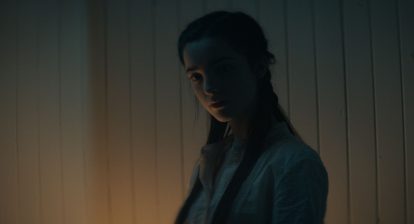The Curse of Mesopotamia is the first English language horror film shot in the Middle East. Writer and director Lauand Omar uses the film to make a statement against ISIS, which is incredible considering that production was forced onto hiatus because of ISIS. The film’s anti-terror message is one of its stronger points.
Curse of Mesopotamia follows five different characters who’ve been sharing the same nightmare for months. They’re brought together by psychiatrist Dr. Barbra (Stacy Thunes) for exposure therapy, because she’s found the castle from their nightmares. Once they’re there, the dreams change, with the characters taking an active role in the history that’s haunted them while they sleep.
Along with the anti-terror stance, the films soundtrack is working extremely well. Roozbeh Mosleh does an excellent job blending familiar Western aural tropes with Eastern instruments. There are a few moments that start with the intense trilling of high notes on violin but as the intensity ramps up, a higher Eastern instrument (possibly a Sitar) comes in higher, enhancing the tension building effect. The soundtrack is livelier in the quieter, dialogue heavy sections, reminiscent of The Cabinet of Dr. Caligari.
The film also introduces some original ideas, playing with the past and present to keep the viewer guessing about exactly what is going on, and how real the dream world is.

The characters as allegory hurts the dialogue. An early scene with the characters eating dinner together, Ahmed says that the dream they’ve all been having isn’t “a nightmare. It’s the devil punishing you.” He goes on to point out that Tony is gay (bisexual, Tony corrects) and the tables gets into a debate about whether sexual orientation matters or not. A few characters storm off, but the dialogue sounds like the playing out of ideas, not a heated conversation between real people.
The characters also make huge life changes, even early on in the movie that are not, that are not consistent with what little we’ve been shown of their character to that point. For example (Spoilers Begin) Veronique, a voluntary mute begins speaking after years of silence after a good night’s sleep and Ahmed gives up on his arrangements to join ISIS, also after a good night’s sleep. It’s meant to be magic , but it still feels like too large a shift to be believable. (Spoilers End). In a smaller way, the character’s extreme reactions to things are also unrealistic and hard to invest in. They’re almost always bickering, and because there aren’t very many pleasant interactions, it’s hard to care about them. It’s like a shouting match starting on a bus. As an unrelated passenger, you just want to get off.
And then there’s the outcome of the ideas. (Spoilers Begin) The movie goes out of its way to introduce the idea that Mesopotamia has always been filled with strife and ISIS is just the latest incarnation of the strife, the successor to a history of violence. Could be true, could be not. I concede that I don’t know as much about the region as Omar does, though I am concerned that he’s propagating the idea that the violence has always been there, so it will always be there. If the violence is perpetual, why should anyone try to stop it? The film pushes further still, saying that the strife has been caused by an unkillable demon, and the only solution is to kill the leaders he’s influencing. It seems like Omar is saying that the solution is to kill ISIS’s leader, but that doesn’t seem like a particularly nuanced or new viewpoint. It seems like that’s the solution that everyone has been espousing, so why do we need a movie to prove that point? (Spoilers End).
 It’s not impossible to tell a great story about politics, or even a political story with speculative elements. It is much harder. District 9 addresses apartheid artfully. The allegory, aliens represent black South Africans and the humans represent white South Africans, is simple and never explicitly stated. The movie starts out examining the interplay between the humans and aliens, following Wikus, a human working on keeping the aliens contained. Once that allegory is established, it fades into the background as the story progresses. Wikus begins slowly transforming into an alien, borrowing heavily from David Cronenberg’s The Fly and depicting Wikus’s transformation and descent into madness. Notice though that the speculative element is asking questions in a way that a realistic film never could. What would happen if a white South African was forced to transform into a black one? What happens when the oppressor is transformed into the oppressed?
It’s not impossible to tell a great story about politics, or even a political story with speculative elements. It is much harder. District 9 addresses apartheid artfully. The allegory, aliens represent black South Africans and the humans represent white South Africans, is simple and never explicitly stated. The movie starts out examining the interplay between the humans and aliens, following Wikus, a human working on keeping the aliens contained. Once that allegory is established, it fades into the background as the story progresses. Wikus begins slowly transforming into an alien, borrowing heavily from David Cronenberg’s The Fly and depicting Wikus’s transformation and descent into madness. Notice though that the speculative element is asking questions in a way that a realistic film never could. What would happen if a white South African was forced to transform into a black one? What happens when the oppressor is transformed into the oppressed?
While Curse of Mesopotamia has its faults, it still does bring original ideas, a strong soundtrack, and makes an admirable attempt at bringing diversity into a too-white English-language movie landscape. The cast and crew should be applauded for carrying on after having their production stopped by ISIS, something that lesser movies would’ve failed to do. It raises interesting questions, though at times those come at the expense of the story. It may be worth watching just to see the first English-language horror movie shot in the Middle East. You can check it out starting August 15th.
WICKED RATING: 6 /10 [usr=6]
Director: Lauand Omar
Writers: Lauand Omar
Stars: Melissa Mars, Terrell Carter, Karim Saidi, Kaoutar Boudarraja, Muaricio Rousselon
Release: August 15, 2016
Studio/ Production Co: Lauand Omar Productions, Visual K. Productions, MENA Film
Budget: $700,000 (estimated)
Language: English
Length: 92 minutes
Sub-Genre: Thriller
Correction: A previous version of this article stated that the budget was $7,000,000 rather than $700,000.







